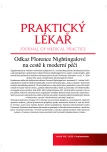-
Články
- Vzdělávání
- Časopisy
Top články
Nové číslo
- Témata
- Kongresy
- Videa
- Podcasty
Nové podcasty
Reklama- Kariéra
Doporučené pozice
Reklama- Praxe
Clinical simulation as a method in midwifery teaching
Authors: M. Moravcová 1; E. Welge 1
Authors place of work: Univerzita Pardubice, Fakulta zdravotnických studií, Katedra porodní asistence a zdravotně sociální práce 1
Published in the journal: Prakt. Lék. 2020; 100(Supplementum): 33-37
Category: Suplementum
Summary
Aim: The main aim of this research survey is to describe methodology behind simulation situations for midwifery students studying towards bachelors degree and to evaluate their effect on the students.
Methods: The respondents were sixteen midwifery third year students. The students actively participated in simulation scenarios in a subject Porodní Asistence III. at Faculty of Health Studies in University of Pardubice from September to November 2019. The research survey was based on teaching simulated situations with immediate feedback from teachers, evaluation straight after from the respondents as well as with the focus group and via written feedback. The aim of facilitated discussion was to identify shortfalls in simulation teaching with good practice and educational method in mind. Furthermore, the students anonymously gave written evaluation.
Results: Methodology for each simulation was made and they formed part of the teaching. The simulations were mainly seen as a good way for learning. The biggest benefit was learning midwifery skills in real like situations, team work and effective communication.
Conclusion: Based on the results, learning through simulation seems as an effective method for pre-degree midwifery students mainly with the aim on obstetric emergencies. .
Keywords:
Simulation – midwifery – education.
Zdroje
- Advanced Life Support in Obstetrics (2009) Advanced Life Support in Obstetrics. (5th ed.) Leawood: American Academy of Family Physicians.
- Andersen, P., Downer, T., O’Brien, S., & Cox, K. (2019) Wearable Simulated Maternity Model: Making Simulation Encounters Real in Midwifery. Clinical Simulation in Nursing, 33(1), 1-6.
- Hendl, J., & Remr, J. (2017). Metody výzkumu a evaluace. Praha: Portál. ISBN 978-80-262-1192-1.
- Honey, P., & Mumford, A. (1992). The manual of learning styles. Maidenhead: P. Honey.
- Kolb, D. (1984). Experiential learning. Englewood Cliffs, N. J.: Prentice-Hall.
- Krishnan, D. G., Keloth, A. V., Ubedulla, S. (2017) Pros and cons of simulation in medical education: A review. Int.Jour. of Medical and health Research, 3(6), 84-87.
- Morgan, D., & Krchová, J. (2001). Ohniskové skupiny jako metoda kvalitativního výzkumu. Boskovice: Albert. ISBN 80-85834-77-4.
- Mukhalalati, B. A., Taylor, A. (2019) Adult Learning Theories in Context: A Quick Guide for Healthcare Professional Educators. Retrieved from https://www.ncbi.nlm.nih.gov/pmc/articles/PMC6458658/.
- NHS Health Education England, Leeds (2019). Simulation. Retrieved from https://www.hee.nhs.uk/our-work/simulation.
- Pasztor, A., Carey, S. (2011) United Continental Pilots Split on Training Simulators. Retrieved from https://www.wsj.com/articles/SB10001424052702304887904576395850731566080.
- Patton, M. Q. (2002). Qualitative Research and Evaluation Methods. London: Sage. ISBN 0761919716.
- So, H. Y., Chen, P., Wong, G. K. C., and Chan, T. N. (2019) Simulation in medical education. Journal of the Royal Physicians of Edinburgh, 49(1), 52-57.
- Statista. (2020) 2019 Was A Safe Year For Air Travel Despite MAX Woes. Retrieved from https://www.statista.com/chart/12393/2017-was-the-safest-year-in-the-history-of-air-travel/.
- Villancourt R. (2009) “I Hear and I Forget, I See and I Remember, I Do and I Understand” Retrieved from https://www.ncbi.nlm.nih.gov/pmc/articles/PMC2826962/ [cit.2020-22-02].
- WHO. (2009). Patient safety. Retrieved from https://www.who.int/health-topics/patient-safety/#tab=tab_1.
Štítky
Praktické lékařství pro děti a dorost Praktické lékařství pro dospělé
Článek vyšel v časopisePraktický lékař
Nejčtenější tento týden
- Nejlepší kůže je zdravá kůže: 3 úrovně ochrany v moderní péči o stomii
- Horní limit denní dávky vitaminu D: Jaké množství je ještě bezpečné?
- S MUDr. Štěpánem Budkou o rizicích obezity pro fertilitu ze všech úhlů pohledu
- Lokální antiseptická terapie faryngitidy – účinnost oktenidinu a zachování integrity střevní mikrobioty
- S prof. Vladimírem Paličkou o racionální suplementaci kalcia a vitaminu D v každodenní praxi
-
Všechny články tohoto čísla
- Spokojenost pacientů s managementem akutní pooperační bolesti ve zdravotnickém zařízení
- Role sestry při indikaci a ordinaci léčivých přípravků
- Coping studentů oborů všeobecná sestra a zdravotnický záchranář
- První zkušenosti s českou verzí Sydneyského dotazníku o polykání
- Development of healthcare professionals’ roles – a physician’s perspective
- Modelové situace jako metoda ve výuce porodní asistence
- Kvalita života pacientů po polytraumatu ve vztahu k Injury Severity Score
- Faktory ovlivňující pracovní spokojenost a motivaci všeobecných sester
- Knowledge, Attitudes, and Practices of Oral Care in Mechanical Ventilated Patients
- Praktický lékař
- Archiv čísel
- Aktuální číslo
- Informace o časopisu
Nejčtenější v tomto čísle- Faktory ovlivňující pracovní spokojenost a motivaci všeobecných sester
- Coping studentů oborů všeobecná sestra a zdravotnický záchranář
- Role sestry při indikaci a ordinaci léčivých přípravků
- Modelové situace jako metoda ve výuce porodní asistence
Kurzy
Zvyšte si kvalifikaci online z pohodlí domova
Autoři: prof. MUDr. Vladimír Palička, CSc., Dr.h.c., doc. MUDr. Václav Vyskočil, Ph.D., MUDr. Petr Kasalický, CSc., MUDr. Jan Rosa, Ing. Pavel Havlík, Ing. Jan Adam, Hana Hejnová, DiS., Jana Křenková
Autoři: MUDr. Irena Krčmová, CSc.
Autoři: MDDr. Eleonóra Ivančová, PhD., MHA
Autoři: prof. MUDr. Eva Kubala Havrdová, DrSc.
Všechny kurzyPřihlášení#ADS_BOTTOM_SCRIPTS#Zapomenuté hesloZadejte e-mailovou adresu, se kterou jste vytvářel(a) účet, budou Vám na ni zaslány informace k nastavení nového hesla.
- Vzdělávání



